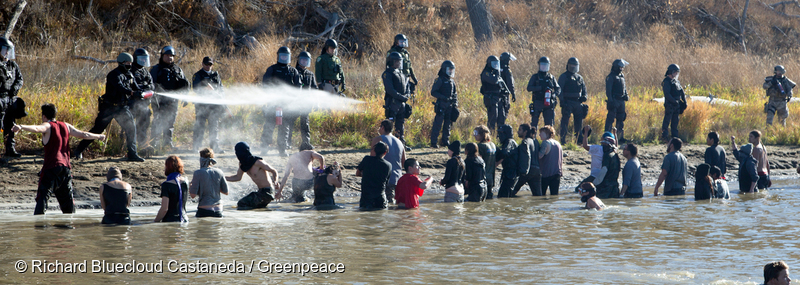Law enforcement has a long tradition of violently upholding racial capitalism, new analysis shows how they are trying to undermine your protest rights.

Our opponents haven’t missed a beat. Continuing a dangerous trend, state legislatures are introducing anti-protest legislation at a rapid pace this year. The bills would increase criminal penalties for vague offenses like unlawful assembly, trespass, and obstruction. Many seek to redefine what constitutes a riot, often by expanding what conduct amounts to a felony.
Recently enacted laws in Florida and Oklahoma even shield drivers from liability for hitting protesters with their cars. These bills are designed to chill the speech of activists, by frightening people from attending the next protest—a warning accomplished by their mere introduction, whether or not the bills ultimately become law.
Who is behind this assault on our democratic right to free speech?
According to a recent investigative report following a new Greenpeace USA report, major corporations are lobbying for these bills behind the scenes, and handing out campaign contributions to local lawmakers who introduce them.
These bills are designed to chill the speech of activists, by frightening people from attending the next protest—a warning accomplished by their mere introduction, whether or not the bills ultimately become law.
But another interest group is close behind: law enforcement, the people who are paid to uphold the law and its constitutional protections. Police associations, like state chapters of the Fraternal Order of Police, lobbied for anti-protest legislation in at least 14 states, since June 1, 2020. The data also shows that police-turned-lawmakers sponsored these bills in at least 19 states. Campaign finance disclosures show that bill sponsors received a disturbing $343,602 from police association PACs (political action committees) during the 2019-2020 election cycle.
But what are these police associations anyways?
Sometimes these groups represent law enforcement in collective bargaining, and thus receive the moniker of “police union.” State employees, like police, are generally prohibited from striking or negotiating wages. But they can negotiate over workplace conditions and restrictions on employment termination. So when a police officer kills someone, the “union” often steps in to protect their interests. AFL-CIO just put out a report looking to reform those practices, but many advocates say the report doesn’t go far enough.
And that’s because police have historically been the enforcers of corporate interests, the goons who break strikes and beat picketers. In the US labor movement’s early stages, workers organized for safe working conditions and fair wages. Unions help workers leverage their collective power against their employer. But those entities were illegal up until 1935, and police enforced those laws, often brutally. The purpose of law enforcement hasn’t changed since then; while police no longer have legal authority to break strikes, they remain the foot soldiers of property interests today, protecting white supremacy, politicians, and racial capitalism generally from attack and critique.

In the southeast US, modern policing started through slave patrols. Which police association sent the most campaign contributions to legislators sponsoring anti-protest legislation? The Southern States Police Benevolent Association, an organization bound geographically by the former Confederacy. We are hardly the first organization to recognize the long, pervasive connection between law enforcement and white supremacist ideology.
Before 1935, employers fought workers’ organizations with private security firms too. Most infamous was the Pinkerton Agency, a private spy outfit during the Civil War that evolved into a private police agency. When workers outnumbered local law enforcement, owners would hire them to break strikes. Fossil fuel companies are doing the same thing today. They regularly retain private security firms, often composed of off-duty law enforcement, to disrupt and arrest pipeline protesters.
For example, Energy Transfer did this in Louisiana, and so did Kinder-Morgan in Pennsylvania. The Louisiana protesters ended up arrested, with the ignominious distinction of being the first arrestees under a new anti-protest law enacted in 2017.
Another Greenpeace report lays out how fossil fuel infrastructure is often built in or alongside communities of color, creating a disproportionate impact of fossil fuel industry pollution. In many communities, those impacts are reinforced by ties between big polluters and local or state law enforcement. Like toxic pollution, that relationship doesn’t stop at the company’s fence: big polluters often hire off-duty law enforcement to protect their property. This arrangement allows polluters to intimidate and suffocate local organizing.

Potential conflicts of interest involving lawmakers who might personally benefit from anti-protest legislation they sponsor or vote for is another key area of concern. In Ohio, Sen. Frank Hoagland (R) was the primary sponsor of S.B. 33, a new “critical infrastructure” or anti-pipeline protest bill that was passed and signed into law by Governor Mike DeWine (R) in January 2021. Hoagland runs a private security firm that consults for oil and gas companies. And we know Hoagland met with a lobbyist retained by fossil fuel behemoth Koch Industries to discuss “critical infrastructure” in 2018.
At least one police department understands the contradictions posed between these new laws and their constitutional duties. The Broward County Sheriff’s Office in Florida decided, on its own, to limit enforcement of one the most restrictive anti-protest laws passed under this new legislative trend. The Department directed its officers against making arrests without first consulting up the chain of command. But even that small acknowledgement lacks concreteness—their understandable wariness stops short of refusing to enforce these unconstitutional laws at all. To some, the financial records supporting this new wave of anti-protest legislation confirms what we already knew: police are agents of repression and act on those interests at the legislative level.
But for others, this information should be downright shocking. The same people paid to protect your right to protest are acting in legislatures across the country to limit your right to do it. That’s why groups across the country are organizing to stop these bills. Greenpeace is working in coalition with dozens of other organizations, including churches, Indigenous groups, and labor, to urge our movement allies to contact their state legislators and ask them to vote against these bills.
To some, the financial records supporting this new wave of anti-protest legislation confirms what we already knew: police are agents of repression and act on those interests at the legislative level.
We are running out of time if we are to avoid the worst impacts of the climate crisis. That means activism opposing new fossil fuel infrastructure is more necessary than ever—the clock won’t stop ticking unless we act. Even pro-industry groups like the International Energy Agency have finally recognized that there is “no need for investment in new fossil fuel supply,” in order to limit global warming to 1.5ºC.
When government laws fail to act within the bounds of planetary limits, movements will resist and demand action. The duty of the police may be to enforce the law, but the politician’s duty is to prevent existential threats, like climate catastrophe. And it is the duty of activists to defend future generations by preventing the problem at its source.
Join Greenpeace in doing everything you can to preserve your rights to resist and put an end to the era of fossil fuels.
